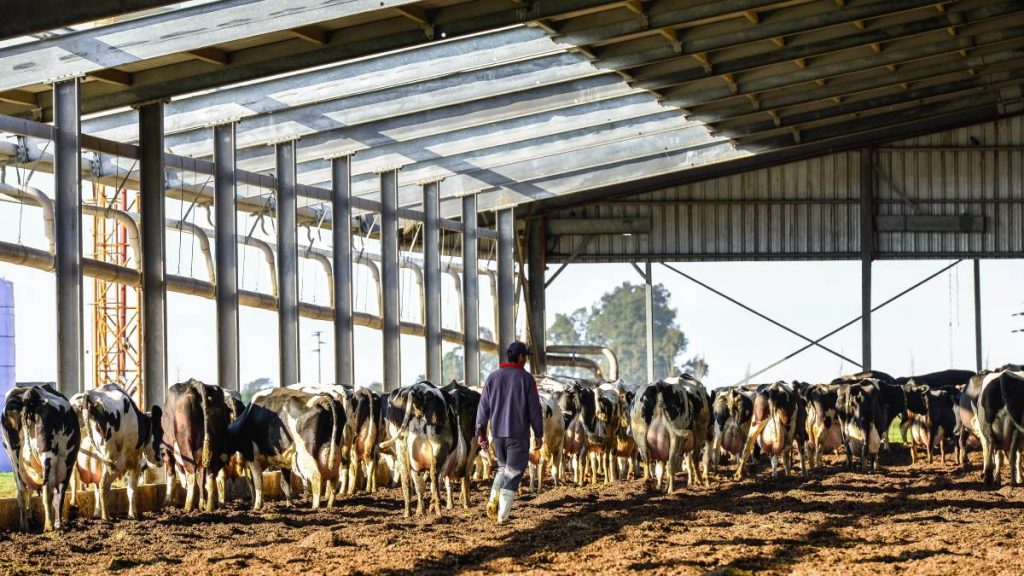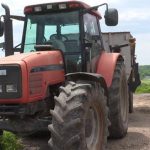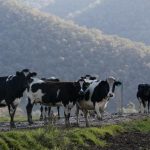
Located at Pellegrini, in the heart of the high rainfall Pampas Humedas (humid Pampas) region about 400 kilometres south west of Buenos Aries, the Chiavassa Group milks 1300 Holstein cows supplying milk, cheese, yogurt and ice cream manufacturers.

Fabrizio Buyatti, Alltech Argentina, Cristian Chiavassa, Alltech Lienert Australia nutrition advisor Toby Doak, Cristobal Chiavassa, and Alltech Argentina manager Jeronimo Larumbe.
On average the herd produces 45,000 litres a day containing 3.4 per cent fat and 3.3pc protein. However, milk solid levels are adjusted according to market demand, particularly in summer when ice cream makers offer up to a 20pc premium.
The key to the operation is its loafing shed system, which maximises cow comfort while minimising health challenges.

The under hoof compost requires constant maintenance, turned twice a day using either a rotary hoe or scarifier.
Each 160×28 metre shed houses about 200 cows, which are milked three times a day through a DeLaval rotary system.
Third generation farmer Cristobal Chiavassa said the 1750-hectare farm was generating US13c/litre profit (about A19c), compared with an industry average of about US3c/litre profit.
Mr Chiavassa said the farm was producing milk for US24c/litre with an average sale price of 37c. Most farms were producing milk for about 30c for a 33c sale price, he said.

The cows are milked three times a day, producing an average of 34.7 litres a day.
“Our attitude is about producing better,” Mr Chiavassa said. “We have the benefit of generations of experience and now the technology to improve efficiency and increase productivity.”
Part of the loafing shed system is the under-hoof compost bedding (peanut shells), which manages the breakdown of manure and promotes herd health.
The compost requires constant maintenance, turned twice a day using either a rotary hoe or scarifier.

Each of the cows is fitted with a collar to monitor rumen activity as part of a forewarning system for mastitis.
Generating heat of up 60 degrees Celcius, the compost also helps to minimise the bacteria that causes mastitis. The compost is removed every six months and replaced with a new peanut shell bedding.
The herd’s somatic cell count is in the 250,000 to 300,000 range, compared to Argentina’s usual 400,000 to 500,000 SCC levels.
Each of the cows is fitted with a collar to monitor rumen activity as part of a forewarning system. Cows that record decreased feed intakes are often in the early stages of mastisis, enabling those cows to be treated at an earlier stage.

The Chiavassa Group grows all of its own roughages, in part thanks to a reliable 1200mm annual rainfall.
Feed management is also a top priority. The Chiavassa Group grows all of its own roughages, in part thanks to a reliable 1200mm annual rainfall.
The silage component of the total mixed ration routinely includes the Alltech toxin binder Mycosorb to maximise feed conversion.
Alltech Lienert Australia nutrition advisor Toby Doak said shedded dairy systems were particularly suited to Australia’s sub-tropics, where higher temperatures and humidity were a major issue.

The milking facility and some of the Chiavassa Group’s cow sheds.
“We’ve already seen a number of these systems introduced into Australia because it is well understood that increased cow comfort directly increases productivity,” Mr Doak said.
“There is certainly a high capital outlay involved but bringing the feed to the cows as part of total mixed ration system is certainly a better way to go because of the increased feed efficiencies.

On average the herd produces 45,000 litres a day.
“There’s virtually no feed wastage or spoilage. It’s one way producers can take much greater control of the environment.”
Alltech Argentina manager Jeronimo Larumbe said the Chiavassa Group was one of Argentina’s leading dairy operations.
“The family has combined technology and generations of experience to maximise the productivity of its dairy operation,” Mr Larumbe said.

Calf rearing on Chiavassa family farm.
Argentina’s highly productive Panpas region covers an amazing 750,000 square kilometres (To put that in perspective, that’s only a fraction under the size of NSW’s 809,000 sq km).
But despite the seemingly massive competitive advantage the agriculture region promises, Argentina is facing massive structural challenges.
Inflation is running at shocking 34 per cent and unemployment has topped 9pc mark.

























